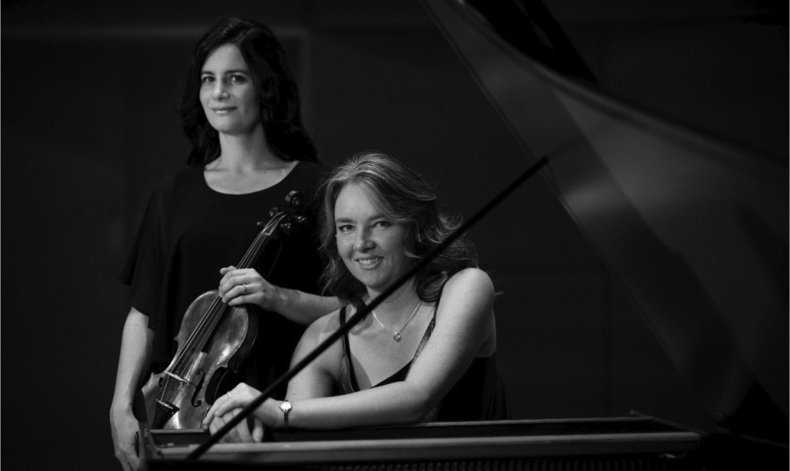Lara Hall & Rachael Griffiths-Hughes (2020)
Waikato University-based duo Lara Hall and Rachael Griffiths-Hughes present a programme of Georgian violin music, full of elegance, drama and the spontaneous flair that their performances are known for.A set of 18th-century sonatas by Joseph Gibbs is accompanied by pieces by Playford and Handel, extending the programme to encompass a wide spectrum of English music and social strata.
Hall and Griffiths-Hughes Review - August 2020
View Programme Notes
In association with Chamber Music New Zealand
Sponsored by BDO
Review of Lara Hall & Rachael Griffiths-Hughes:
Concert Review - Tauranga Musica
Lara Hall & Rachael Griffiths-Hughes
When I was a university student beginning my specialised studies of baroque music performance, I was asked by a fellow performance major, "What is it that you specifically enjoy about baroque music? It all sounds the same" I might add that he was a pianist, specialising in 19th Century performance. That question was perhaps most succinctly answered in concert by violinist, Laura Hall, and harpsichordist, Rachel Griffiths-Hughes in a programme which featured violin works of the English baroque. Although sarabandes, gigues and other 18th century dance forms are not everyone's idea of a good time, I can not think of a more enjoyable or pleasurable concert in recent memory.
Bookending their concert, were works by John Playford, a composer whose music contains all the thrill and flavour of the English restoration. With its distinctive French influence, Playford's music celebrates the Merry Monarch's glorious restoration to the English throne (following Cromwell's dreary Commonwealth) having spent his exile in France at the court of the Sun King where Lully reigned supreme as the musical director and voice of all French music. La Folia, which concluded the concert, is something of a theme and variations based on a simple 15th century chordal structure. Each variation became more wild and more urgent as the musicians played with deep passion and intense energy almost beckoning their audience to the dance.
As is to be expected, no concert of English baroque music would be complete without Handel. In total, Hall and Griffiths-Hughes performed 3 sonatas for violin by the cosmopolitan composer. Each and everyone of these is charming and they were performed with all the stately reservedness and regal dignity they demand of a performer. A brilliant musical tactician, Handel calls upon all his practical knowledge and study spent in Italy and adapts these forms to a distinctly majestic English sound, captured sublimely by Hall's sensitive touch.
These sonatas form part of the essential syllabus of any young violin student. So, it was most encouraging and indeed heartwarming to see so many young music students in attendance. It is my fervent hope that they were so inspired hearing these familiar works which they undoubtedly study, performed with such supreme grace and stylistic accuracy.
Hall and Griffiths-Hughes played no fewer than 4 sonatas by Joseph Gibbs, a name which will not mean much to many. A contemporary of Handel's, Gibbs was a small town composer by comparison whose music never enjoyed the distinction and patronage of the English court. More's the pity. While Handel's music contains few risks, Gibbs' contains far more unexpected twists and turns and is, at times, more forward looking even to the fashions of the classical era. By 18th century standards, Gibbs lived a ridiculously long life, dying only three years before the death of Mozart, the undeniable giant of the classical era. While his music perhaps lacks the refinement of Handel's courtly sound, it is nevertheless fresh and fantastically creative. While not quite the master of melody that Handel was in his sonatas, Gibbs more than makes up for in pure interest and virtuosity.
The first half of the concert contained two of Gibbs' sonatas. While the first of the two lacked any real excitement it was different and pretty enough to pique the interest and stir sufficient desire to want to hear more. The second of the two in the first half was much more original and revealed some truly unexpected surprises.
The two Gibbs sonatas in the second half of the afternoon were remarkable and contained the best music and the finest playing of the concert. Sonata VIII, the most technically demanding, surely cements Hall's reputation as one of the finest Baroque violinists in the country. Requiring any string player to perform a multi-voiced fugue is both unnecessary and cruel and demands that the player to be on no fewer than 2 strings at any given time. Coupled with the rather unforgiving key to string players of Eb major, and there are all the elements for the demise and undoing of many fine musicians. But, Hall delivered with almost effortless virtuosity.
The second of these two, Sonata IV, while not as technically challenging is perhaps Gibbs' finest work. It brims with immense beauty and elegance; and both performers seemed to understand this at the most intimate of levels. The serene opening Largo ends far too quickly. From its first note to its very last, this sonata was a perfect musical moment in time.
Hall and Griffiths-Hughes are undoubtedly giants of the baroque aesthetic in performance here in Aotearoa. The early music scene is enriched exponentially by not just their academic knowledge but also by their formidable skill as musicians of the very finest calibre. It is understood this recital marks the beginning of a tour which will take this music up and down the country. Go! Hear it! This concert embodies everything that is to love about baroque music.
- Chalium Poppy, Sunday 23rd August 2020
Previous concert
Next concert
